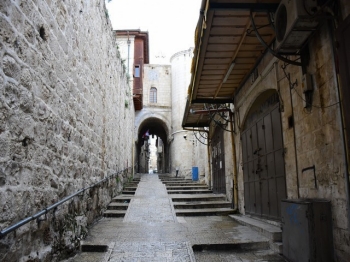An update about the effects of COVID-19 from the Latin Patriarchate

Immediately before Easter, the Chief Executive Officer of the Latin Patriarchate of Jerusalem, Sami El-Yousef, shared an update about the situation that is faced by local communities in Palestine, Israel and Jordan. Palestine and Jordan had a relatively low number of cases but they have imposed high restrictions since the beginning of the pandemic. Israel joined later but is registering a higher number in cases and deaths because of Covid-19.
The first Coronavirus cases in the area were discovered in a hotel in Bethlehem in early March. The Palestinian Authority declared a national emergency on 5 March 2020 for 30 days closing all schools, universities and places of worship. The national emergency was later renewed on 4 April 2020 for an additional thirty days despite the relatively low rate of spread. “Given that life came to a standstill, all businesses closed which affected practically everyone. The Bethlehem region with its high reliance on the tourism related businesses is the hardest hit. In other areas the crisis took longer to be felt, especially areas from the northern part of the West Bank where day laborers working in Israel proper continued to be allowed to work temporarily thereafter, only to be sent back recently to the Palestinian Territories due to the Jewish holidays. Thus, all the day laborers in Israel have by now been stripped of their income without any protection. It is difficult to have accurate statistics about the unemployment rates now, but it could easily reach 50-70% for the time being,” writes Sami El-Yousef on April 8. Luckily enough, only very few cases were registered in Gaza.
In Jordan all schools were closed on March 9. Around mid-March, the government declared a national emergency and imposed a lockdown on March 17. Before the pandemic, “unemployment in Jordan reached 19% with the youth suffering the most with rates reaching 49% for youth under 19 and 39% for youth between 20-24. These rates would have at least doubled in recent weeks,” affirms the CEO of the Latin Patriarchate.
In education, both in Palestine and Jordan the schools were able to teach online using the new platform adopted at the beginning of the year EduNation which lends itself to distance learning. In Jordan, since the lockdown started a bit later, teachers were able to attend training workshops about how to teach online, an opportunity that their Palestinian colleagues did not have. However – Sami El-Yousef explains – there are big challenges related to online education due to the lack of adequate technology and lack or weak internet access in many homes, as well as the fact that large families share one computer and many families do not have the educational level to assist their children.
In Israel schools were closed on March 16. There, “the Ministry of Education committed to pay the full subsidies to the schools through the end of the school year which will enable the schools to pay salaries in full without any major financial difficulties,” reports the CEO of the Latin Patriarchate.
A sad note concerns the Migrant Community in Israel that is suffering heavily since “many members are undocumented and working as day laborers. They were the first to be let go from work and they are not entitled to any of the safety net of the government support as they are not entitled to such benefits, nor do they have adequate health insurance,” Sami El-Yousef comments.
As we have seen happening in many regions of the world, community to community and neighbor to neighbor support has been a vital means to survive and Archbishop Pizzaballa strongly encouraged it. “This worked perfectly for the past period as we have not seen such local generosity in a long time. Wealthier parishes are supporting the ones with less means,” gladly shares Sami El-Yousef. “However – he concludes - as expected and as this situation is becoming prolonged and is expected to last for a very long time and also even when the emergency is over and we gradually return to a more normal pattern, unemployment will continue to be very high for the foreseeable future and families will need assistance.”
Elena Dini
(May 2020)



